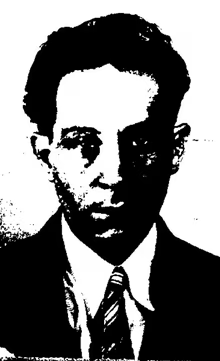
🧵Mufti Muhammad Sadiq (Ra) - The Missionary who revived #ISLAM in America 🇺🇸
'All historians agree that Mufti Sadiq’s steps on American soil served as the dawn of an Islamic identity in America.' (The Cambridge Companion to American Islam)
What academics say 👇

'All historians agree that Mufti Sadiq’s steps on American soil served as the dawn of an Islamic identity in America.' (The Cambridge Companion to American Islam)
What academics say 👇


Mufti Sadiq (ra) was the first Ahmadi Muslim missionary to take the message of #Islam to America, and among the very first to actually revive the message of Islam in America. 

Historians credit the Ahmadiyya contribution to Islam in America by acknowledging that it was Mufti Sadiq who “established the first, and in some cases, the only, centres for Islamic gatherings.” (The Cambridge Companion to American Islam) 

Mufti Sadiq (ra) is unanimously described as “a learned and well-respected representative of his faith, a philologist and expert in Arabic and Hebrew. He also had a deep spiritual commitment, and came to his task with ardour.” (The Oxford Handbook of American Islam, p. 146)
He was instructed by Hazrat Mirza Bashiruddin Mahmud Ahmad (ra) in December 1919, to proceed to America and take the message of Islam Ahmadiyyat to Americans (Al Fazl, Qadian, 11 December 1919).
He boarded the SS Haverford (a major transatlantic steamship) from Liverpool, UK that set sail for the American state of Pennsylvania on January 24, 1920, arriving on February 15, 1920. (Richard Brent Turner, Islam in the African-American Experience).
On arrival, he was arrested in the US on suspicion of preaching polygamy (The Cambridge Companion to American Islam). He argued #Islam allows men to marry up to four women, but it's not obligatory. The tribunal accepted his argument, allowing him to walk free with a condition. 

Mufti Sadiq's story is recounted in "Islam in the African-American Experience", highlighting the challenges faced by early Islamic missionaries in America. The time spent behind bars was not wasted as Mufti Sadiq utilised this time in propagating the message of true Islam. 

Many in the detention centre showed an interest and he converted 19 inmates to Islam in a short period of 2 months, before his release in April 1920. (Islam in the African-American Experience, p. 116)
The Immigration Act of 1870 understood polygamy as a commandment of Islam, thus not allowing Muslims into America. Mufti Sadiq, by appealing against the deportation orders of the immigration authorities and by presenting his case before the American federal Government...
became the first #Muslim to initiate a campaign to remove Western misconceptions about Islam. Yvonne Haddad, & co-author Jane Smith, declares the Ahmadiyya Muslim Community was “unquestionably the most influential group in African American Islam.”
Richard Brent Turner sees the Ahmadiyya Muslim Community as “unquestionably one of the most significant movements in the history of Islam in the United States in the twentieth century, providing as it did the first multi-racial model for American Islam.”
Mufti Sadiq, under the guidance of the second Khalifa, proactively “established mosques and reading rooms, translated the Quran into English, and countered what they saw as the distortions of Islam by the media.” (The Oxford Handbook of American Islam, p. 146.)
By May 1920, he contributed 20 articles on #Islam to American periodicals and newspapers, including @nytimes The New York Times. In his first year, he delivered 50 public lectures on a variety of subjects in American cities, including Chicago, New York, Detroit and Michigan.
Richard Brent Turner describes him as a “learned man” who “was a graduate of the University of London, a philologist of international repute, and an expert in Arabic and Hebrew whose work had been published in [The] Philomath.” (Ibid.)
He also initiated the publication of The Moslem Sunrise – the first English-language Muslim newspaper to be published in America (The Cambridge Companion to American Islam)
Mufti Sadiq (ra) and his co-missionaries “attracted more than one thousand converts, most of them African Americans in cities such as Chicago and Detroit.”(The Cambridge Companion to American Islam)
Historians credit the Ahmadiyya contribution to Islam in America by acknowledging that it was Mufti Sadiq who “established the first, and in some cases, the only, centres for Islamic gatherings.” (Ibid)
Sylviane A Diouf credits the efforts of Mufti Sadiq by stating the Ahmadiyya Movement provided “Qurans and other Islamic literature in English.” (The Oxford Handbook of American Islam)
Mufti Sadiq (ra) was awarded degrees from the College of Divine Metaphysics and the Oriental University, affiliated with the spiritualist Universal Theomonistic Association (The Cambridge Companion to American Islam)
Mufti Sadiq was also awarded a degree by Lincoln-Jefferson University in recognition of his work. (Lincoln-Jefferson University Bulletin, 1922-1925, Vol. V, No. 1b).
Under the guidance of Khilafat-e-Ahmadiyya, he opened the doors for Islam to spread in #America.
Full referencing and more about Mufti M Sadiq (ra):
alhakam.org/mufti-muhammad…
Full referencing and more about Mufti M Sadiq (ra):
alhakam.org/mufti-muhammad…

• • •
Missing some Tweet in this thread? You can try to
force a refresh
 Read on Twitter
Read on Twitter









